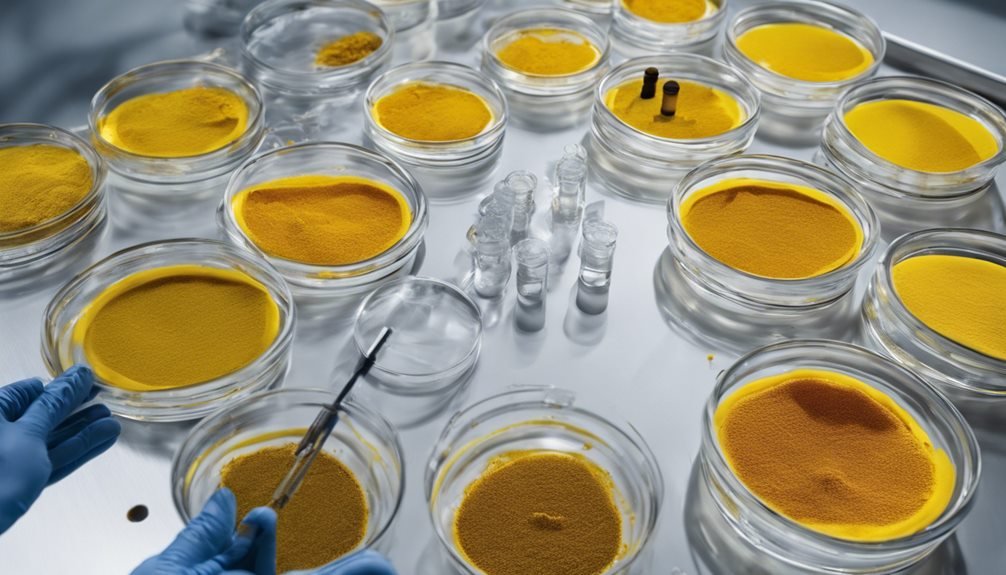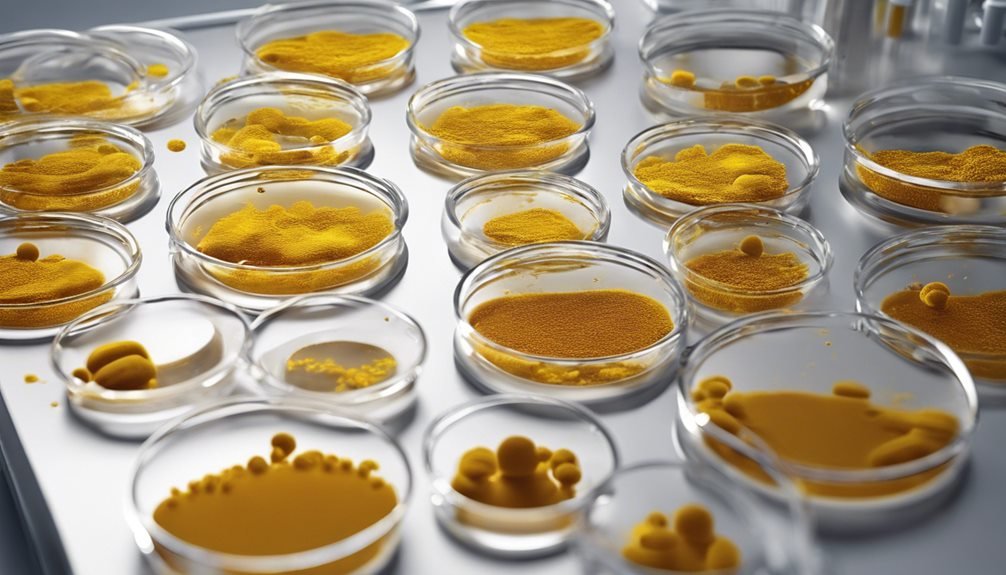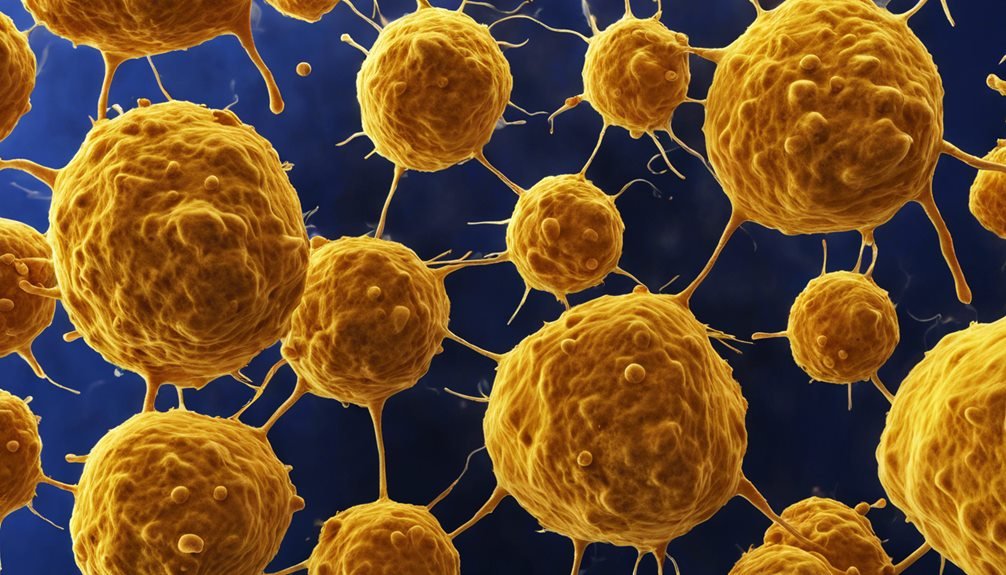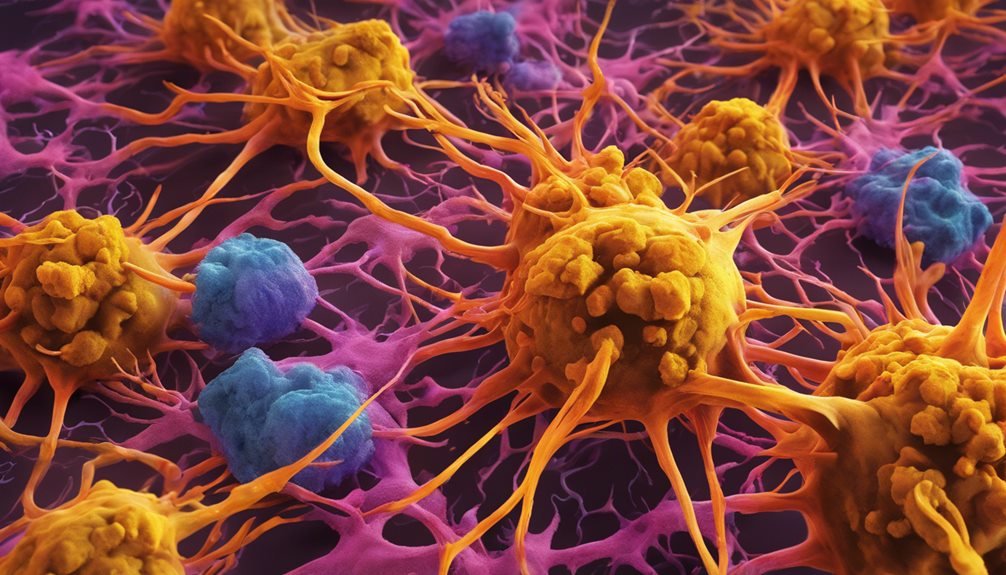Have you ever wondered about the potential of turmeric in the realm of cancer research? The latest studies on turmeric's active compound, curcumin, are shedding light on its intriguing effects on cancer cells. With promising results in bioavailability and synergistic actions with traditional treatments, turmeric is carving a path as a possible cancer-fighting agent. The intricate mechanisms through which curcumin interacts with cancer cells make it a topic worth exploring further.
Key Takeaways
- Recent studies show turmeric's potential in cancer prevention.
- Curcumin targets cancer cell pathways for inhibition.
- Combining turmeric with chemotherapy enhances treatment outcomes.
- Turmeric's anti-inflammatory effects impact cancer development.
- Clinical trials highlight curcumin's efficacy in cancer therapy.
Turmeric's Anti-Cancer Properties
Turmeric has been extensively studied for its potential anti-cancer properties. One key aspect that researchers have focused on is the bioavailability of turmeric, particularly its active compound curcumin. Curcumin's efficacy in inhibiting cancer cell growth and promoting apoptosis has shown promising results in various preclinical and clinical studies.
Studies have highlighted the challenges associated with the bioavailability of curcumin, as its absorption in the body is limited. Researchers have been exploring different formulations and delivery methods to enhance the bioavailability of curcumin, such as combining it with piperine from black pepper or encapsulating it in nanoparticles.
Despite the limitations in bioavailability, the powerful anti-inflammatory and antioxidant properties of curcumin make it a promising candidate for cancer prevention and treatment.
Continued research into improving the bioavailability of curcumin and understanding its mechanisms of action against cancer cells will pave the way for more effective therapeutic strategies in the future.
Curcumin's Mechanisms Against Cancer
Research on curcumin's mechanisms against cancer has unveiled intricate pathways through which this compound exerts its anti-cancer effects. Curcumin, the active ingredient in turmeric, targets multiple molecular pathways involved in cancer development and progression. One of the key molecular targets of curcumin is the NF-kB pathway, which regulates genes related to inflammation, cell proliferation, and apoptosis. By inhibiting NF-kB, curcumin can suppress the growth of cancer cells and induce their death.
Additionally, curcumin modulates various signaling pathways within cancer cells, such as the PI3K/Akt pathway, which is crucial for cell survival and growth. By interfering with these pathways, curcumin can inhibit the proliferation of cancer cells and promote their apoptosis.
Furthermore, curcumin has been found to target molecules involved in angiogenesis, metastasis, and drug resistance, making it a promising agent for combating various aspects of cancer progression. Understanding the intricate mechanisms by which curcumin acts against cancer is essential for developing targeted therapies that exploit turmeric's potential in cancer treatment.
Turmeric in Cancer Prevention

Incorporating certain dietary components has been a topic of interest in the realm of cancer prevention. Turmeric, with its active component curcumin, has gained attention for its potential preventive effects against cancer. Clinical trials have shown promising results regarding turmeric's role in cancer prevention. Turmeric exerts its effects through various molecular pathways, such as modulating inflammation, oxidative stress, and cell signaling pathways that are involved in cancer development.
Studies have highlighted turmeric's ability to inhibit the growth of cancer cells and induce cell death, making it a potential ally in cancer prevention strategies. Furthermore, turmeric has been found to possess antioxidant properties that can protect cells from DNA damage and mutations that may lead to cancer.
Curcumin's Effects on Tumor Growth
When examining the impact of curcumin on tumor growth, researchers have observed significant modulation in key pathways associated with cancer progression. Curcumin, a bioactive compound in turmeric, has shown promising effects on tumor regression and enhancing the immune response against cancer cells. Here are some key points to consider:
- Tumor Regression: Studies have indicated that curcumin can induce tumor regression by inhibiting the growth of cancer cells and promoting their death through various mechanisms.
- Immune Response: Curcumin has been found to enhance the immune system's ability to recognize and target cancer cells, potentially improving the body's natural defense mechanisms against tumors.
- Curcumin Dosage: Optimal curcumin dosage is crucial for maximizing its anti-tumor effects. Research suggests that a carefully calculated dosage regimen may enhance treatment efficacy.
- Treatment Efficacy: Combining curcumin with conventional cancer treatments has shown potential synergistic effects, improving overall treatment outcomes and patient prognosis.
Understanding the intricate interplay between curcumin, tumor growth, and immune responses is essential for harnessing the full potential of this natural compound in cancer therapy.
Turmeric and Chemotherapy Synergy

The synergy between turmeric and chemotherapy holds significant promise in enhancing treatment outcomes for cancer patients. Research suggests that combining turmeric with chemotherapy can lead to improved efficacy in fighting cancer cells. When used in a chemotherapy combination, turmeric has shown the potential to enhance the therapeutic effects of traditional cancer treatments.
Studies indicate that the effectiveness of chemotherapy can be boosted when combined with specific dosages of turmeric. The active compound in turmeric, curcumin, has demonstrated the ability to increase the sensitivity of cancer cells to chemotherapy drugs, making the treatment more potent against tumors.
Additionally, turmeric's anti-inflammatory and antioxidant properties can help mitigate some of the side effects associated with chemotherapy, improving the overall quality of life for cancer patients undergoing treatment.
Curcumin's Anti-Inflammatory Effects
Curcumin, the key bioactive component found in turmeric, exerts potent anti-inflammatory effects that have been extensively studied in the context of various health conditions, including cancer. When considering its impact on inflammation, it's crucial to understand the mechanisms through which curcumin operates. Here are some key points to consider:
- Oxidative Stress Reduction: Curcumin has been shown to decrease oxidative stress levels in the body, which plays a significant role in chronic inflammation and the development of various diseases.
- Gene Expression Modulation: Studies have demonstrated that curcumin can regulate gene expression related to inflammation, potentially inhibiting the production of pro-inflammatory molecules.
- Inhibition of Inflammatory Pathways: Curcumin can suppress specific pathways involved in inflammation, such as the NF-κB pathway, leading to reduced inflammation and associated damage.
- Immune System Modulation: Curcumin's anti-inflammatory properties also involve modulating immune responses, which can further contribute to its overall beneficial effects on health.
Turmeric's Impact on Cancer Cells

Investigating turmeric's impact on cancer cells reveals a compelling area of research that delves into the potential therapeutic properties of this natural compound.
Turmeric, specifically its active component curcumin, has shown promising effects on cancer cells through its influence on cellular pathways and molecular targets. Studies have indicated that curcumin can modulate various cellular pathways involved in cancer development and progression.
By targeting key molecular pathways, curcumin exerts anti-cancer effects by disrupting signaling cascades that promote tumor growth and metastasis. Furthermore, curcumin's ability to interact with specific molecular targets within cancer cells leads to inhibition of proliferation, induction of cell cycle arrest, and suppression of tumor invasion.
Understanding turmeric's impact on cancer cells at the cellular and molecular levels is crucial for identifying novel therapeutic strategies that harness the potential of this natural compound in combating cancer effectively.
Curcumin's Role in Apoptosis
Exploring the intricate mechanisms underlying cancer cell death, curcumin emerges as a fascinating subject of study for its potential role in promoting apoptosis. Curcumin, a bioactive compound found in turmeric, has shown promising effects in inducing programmed cell death in various cancer types. Here are key aspects of curcumin's apoptotic mechanisms:
- Activation of Caspases: Curcumin has been observed to activate caspases, which are crucial enzymes involved in initiating apoptosis in cancer cells.
- Upregulation of Bax: By upregulating the expression of pro-apoptotic protein Bax, curcumin helps in promoting apoptosis while inhibiting anti-apoptotic factors.
- Disruption of Mitochondrial Function: Turmeric's pro-apoptotic effects include disrupting mitochondrial function, leading to the release of apoptotic factors that trigger cell death.
- Inhibition of Survival Pathways: Curcumin interferes with various survival pathways in cancer cells, tipping the balance towards apoptosis and hindering cancer progression.
Understanding curcumin's intricate apoptotic mechanisms sheds light on its potential as a natural compound for cancer therapy.
Turmeric's Potential for Metastasis Prevention

Turmeric emerges as a promising candidate for metastasis prevention in cancer treatment. Metastasis inhibition, which involves the spread of cancer cells from the primary tumor to other parts of the body, is a critical aspect of cancer management. Studies have shown that turmeric, specifically its active compound curcumin, plays a significant role in inhibiting the process of tumor spread. Curcumin has been found to interfere with various stages of metastasis, such as cell migration, invasion, and adhesion, ultimately reducing the ability of cancer cells to metastasize.
Research suggests that curcumin exerts its metastasis prevention effects through multiple pathways, including the regulation of key molecular targets involved in metastasis. By targeting these pathways, curcumin can potentially impede the spread of cancer cells to distant organs, thereby improving patient outcomes.
The ability of turmeric to inhibit metastasis highlights its potential as a valuable adjunct therapy in cancer treatment, emphasizing the importance of further exploration into its mechanisms and efficacy in preventing cancer progression.
Curcumin's Bioavailability in Cancer Treatment
In considering the application of curcumin in cancer treatment, a critical aspect that demands attention is the bioavailability of this compound. When it comes to utilizing curcumin for its potential anti-cancer properties, bioavailability plays a crucial role in its effectiveness. Here are some key points to consider:
- Bioavailability Studies: Numerous studies have focused on enhancing the bioavailability of curcumin through various formulations such as nanoparticles, liposomes, and phospholipid complexes.
- Clinical Trials: Clinical trials have been conducted to evaluate the bioavailability and efficacy of curcumin in cancer patients, providing valuable insights into its potential as a therapeutic agent.
- Challenges: Despite efforts to improve bioavailability, challenges still exist in achieving optimal levels of curcumin in the bloodstream due to its rapid metabolism and poor absorption.
- Future Directions: Future research directions include exploring novel delivery systems and combination therapies to enhance curcumin's bioavailability and maximize its anti-cancer effects.
Turmeric's Chemopreventive Properties

With a focus on the potential benefits for cancer prevention, research has delved into the chemopreventive properties of turmeric. Turmeric research trends have shown promising results in utilizing this natural compound as a preventive measure against cancer. Chemoprevention approaches involving turmeric, specifically its active component curcumin, have gained attention due to their potential in inhibiting carcinogenesis. The bioavailability of curcumin plays a crucial role in its efficacy as a chemopreventive agent, impacting its absorption and distribution within the body.
Studies have highlighted the cancer prevention implications of curcumin, suggesting its ability to interfere with multiple cellular signaling pathways involved in tumor initiation and progression.
Turmeric's chemopreventive properties are being further explored to understand the mechanisms behind its anti-cancer effects and its potential as a complementary approach in cancer prevention strategies. As research continues to uncover the therapeutic potential of turmeric in cancer prevention, incorporating this natural ingredient into dietary habits may prove beneficial in reducing the risk of cancer development.
Curcumin's Clinical Trial Insights
Research into the chemopreventive properties of curcumin has paved the way for clinical trials aimed at uncovering the potential therapeutic benefits of this active compound in cancer prevention. Here are some insights from recent clinical trials:
- Dosage Recommendations: Clinical trials suggest that curcumin's efficacy varies based on the dosage administered. Studies have shown that higher doses may be more effective in targeting cancer cells, but consultation with a healthcare provider is crucial to determine the appropriate dosage for individual needs.
- Side Effects: While turmeric is generally well-tolerated, some individuals may experience side effects such as gastrointestinal issues or allergic reactions. Clinical trials have helped identify these potential side effects, highlighting the importance of monitoring any adverse reactions during curcumin supplementation.
- Efficacy in Combination Therapies: Certain clinical trials have explored curcumin's efficacy when used in combination with traditional cancer treatments. Results indicate a potential synergistic effect, showing promise for enhancing treatment outcomes.
- Bioavailability Challenges: Clinical research has highlighted the challenge of curcumin's poor bioavailability, prompting the development of novel delivery systems to improve its absorption and effectiveness in cancer treatment.
Frequently Asked Questions
Can Turmeric Be Used as a Substitute for Traditional Cancer Treatments?
Turmeric isn't a proven substitute for traditional cancer treatments. Efficacy comparison shows that while turmeric has some potential benefits, it isn't a standalone cure. Patient acceptance varies, but it's crucial to consult healthcare providers for evidence-based treatment plans.
Integrating turmeric into a balanced diet might offer additional support, but it shouldn't replace conventional medical interventions in cancer treatment. Always prioritize proven treatments for optimal outcomes.
Are There Any Risks or Side Effects Associated With Using Turmeric for Cancer?
When considering using turmeric for cancer, it's crucial to be aware of potential interactions with medications and other treatments.
Long-term effects of turmeric usage aren't extensively studied, so caution is advised.
Understanding the risks and side effects associated with turmeric is essential in making informed decisions about incorporating it into your cancer treatment plan.
Always consult with your healthcare provider to ensure safe and effective management of your condition.
How Does the Quality of Turmeric Supplements Affect Their Effectiveness Against Cancer?
When considering the effectiveness of turmeric supplements against cancer, the quality of the supplement matters greatly. Supplement purity ensures that you're receiving a potent and uncontaminated product.
Bioavailability concerns impact how well your body can absorb and utilize the active compounds in turmeric. Opting for high-quality supplements with good bioavailability can enhance the potential benefits in combating cancer.
It's crucial to choose reputable brands that prioritize purity and bioavailability.
Can Turmeric Interact Negatively With Other Cancer Medications or Treatments?
Turmeric may have drug interactions with certain cancer medications, impacting treatment compatibility. It's crucial to consult healthcare providers before combining turmeric with other cancer treatments to avoid potential negative effects.
Understanding how turmeric interacts with medications can help ensure the effectiveness of cancer therapies.
Always disclose all supplements and medications to your healthcare team for personalized guidance and to prevent any adverse interactions that could impact your treatment outcomes.
Is There a Recommended Dosage of Turmeric or Curcumin for Cancer Patients?
To reap the potential benefits of turmeric for cancer, determining optimal dosages is crucial. Considering individual health factors and ongoing treatments, consulting with a healthcare professional is recommended to establish a safe and effective dosage.
Research suggests that a typical dose ranges from 500-2,000 mg of curcumin daily. Adhering to these guidelines can help maximize the therapeutic effects of turmeric while minimizing any potential risks or interactions with other medications.
Conclusion
You've just scratched the surface of the groundbreaking research on turmeric and cancer. With its potent anti-cancer properties, curcumin is like a superhero battling cancer cells on multiple fronts. From inhibiting tumor growth to enhancing the effects of chemotherapy, turmeric is a powerhouse in cancer prevention and treatment. Stay tuned for more exciting developments as clinical trials continue to unravel the full potential of this natural compound in the fight against cancer.





